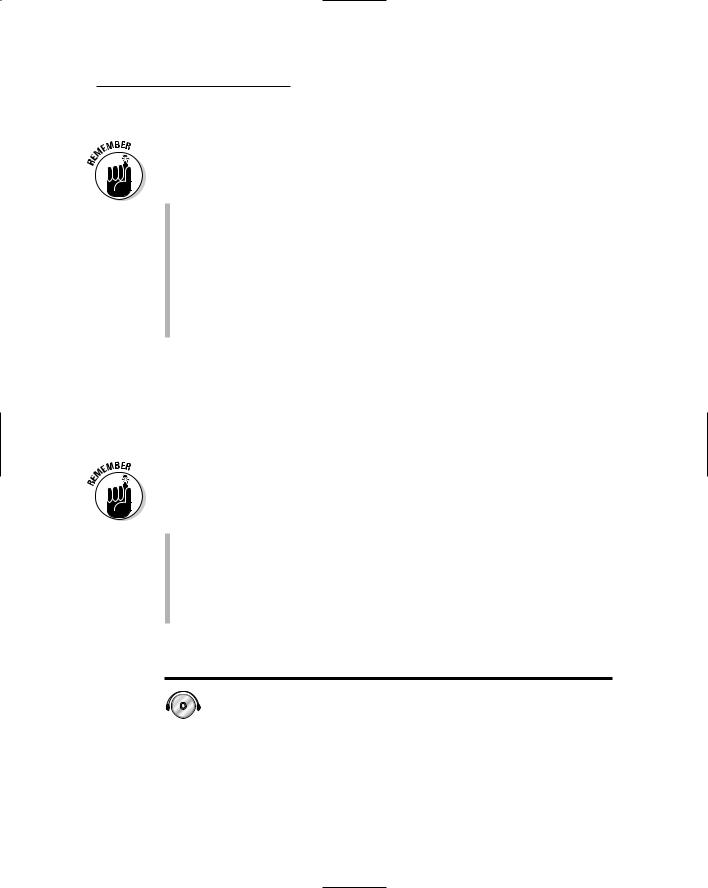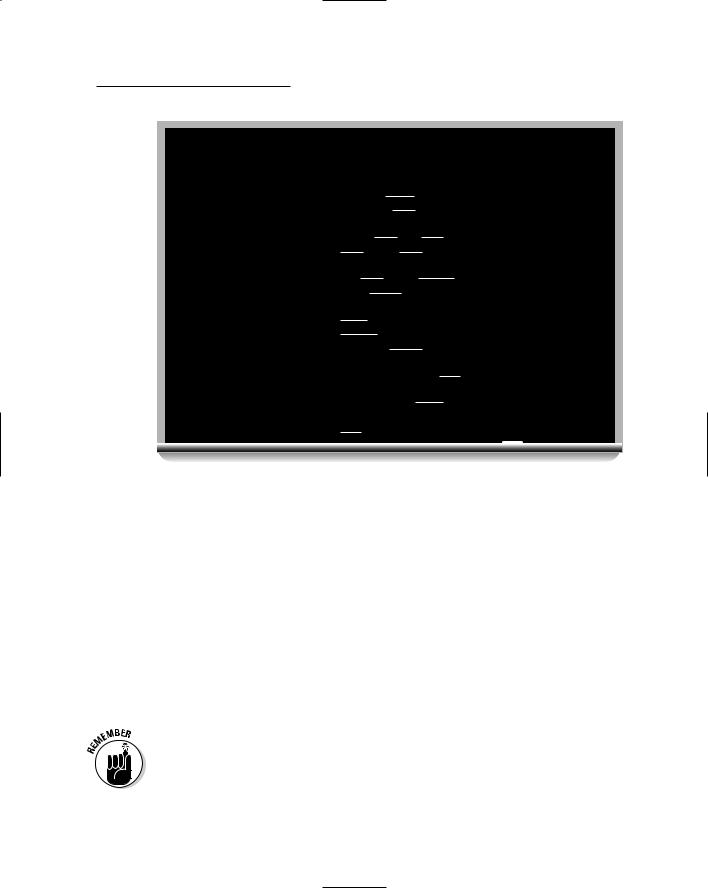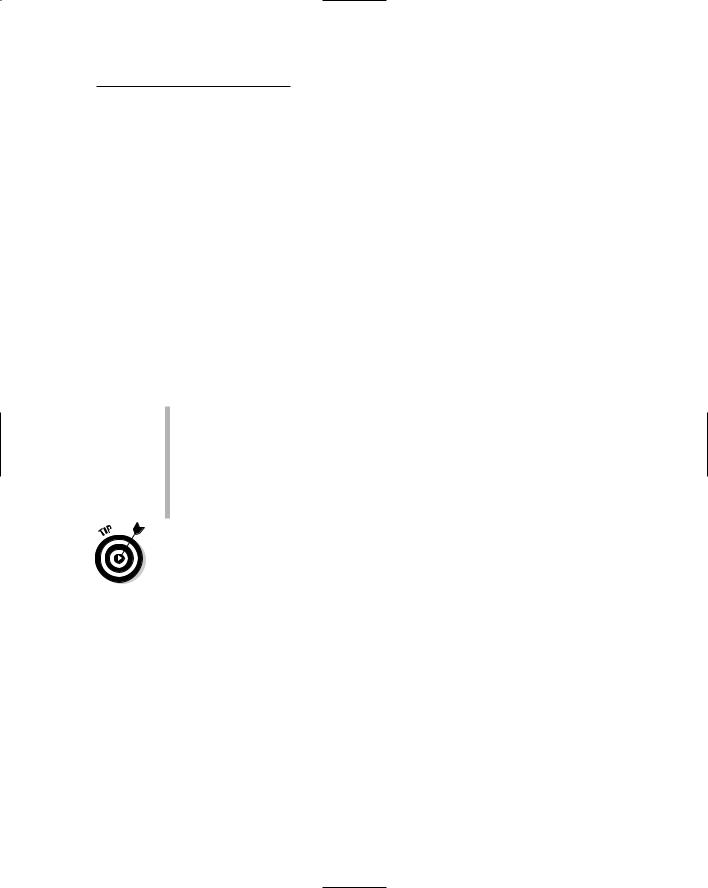
Russian For Dummies
.pdf
184 Part II: Russian in Action
Table 9-1 (continued)
Conjugation |
Pronunciation |
Translation |
on/ona nabirayet |
ohn/ah-nah nuh-bee- |
He/she dials or He/she is |
|
rah-eet |
dialing |
my nabirayem |
mih nuh-bee-rah-eem |
We dial or We are dialing |
|
|
|
vy nabirayetye |
vih nuh-bee-rah-ee-tee |
You dial or You are dialing |
|
|
(formal singular and plural) |
|
|
|
oni nabirayut |
ah-nee nuh-bee-rah-yut |
They dial or They are dialing |
|
|
|
Russian makes a grammatical distinction between calling a person, calling an institution, and calling a different city or a country. The following rules apply (see Chapter 2 for more details about cases):
If you’re calling a person, use the dative case, as in Ya khochu zvonit’ Natashye (ya khah-choo zvah-neet’ nuh-tah-shih; I want to call Natasha).
If you’re calling an institution, after the verb, use the preposition v or na + the accusative case to indicate the institution you’re calling, as in zvonit’ na rabotu (zvah-neet’ nuh ruh-boh-too; to call work) or zvonit’ v magazin (zvah-neet’ v muh-guh-zeen; to call a store).
If you’re calling a foreign country or another city, after the verb, use v + the accusative form of the city or country you’re calling, as in zvonit’ v Amyeriku (zvah-neet’ v uh-mye-ree-koo; to call the U.S.).
Unfortunately, zvonit’ is nothing but an infinitive, and you can’t do much with infinitives if you intend to engage in serious conversation about telephone matters. So we thought it would be a good idea to provide you with the present tense of this important verb in Table 9-2.
Table 9-2 |
Conjugation of Zvonit’ |
|
Conjugation |
Pronunciation |
Translation |
ya zvonyu |
ya zvah-nyu |
I call or I am calling |
|
|
|
ty zvonish’ |
tih zvah-neesh |
You call or You are calling |
|
|
(informal singular) |
|
|
|
on/ona zvonit |
ohn/ah-nah zvah-neet |
He/she calls or He/she is |
|
|
calling |
my zvonim |
mih zvah-neem |
We call or We are calling |
|
|
|

Chapter 9: Talking on the Phone and Sending Mail 185
Conjugation |
Pronunciation |
Translation |
vy zvonitye |
vih zvah-nee-tee |
You call or You are calling |
|
|
(formal singular and plural) |
|
|
|
oni zvonyat |
ah-nee zvah-nyat |
They call or They are calling |
|
|
|
Now, imagine that you head to the phone and pick up the receiver. If you hear dolgiye gudki (dohl-gee-ee goot-kee; long zoom), it means that the phone is svobodyen (svah-boh-deen; not busy), and you need to be patient until somebody answers the phone. While you’re waiting for somebody to answer, you may think to yourself, Nikto nye podkhodit k tyelyefonu (neek-toh nee paht- khoh-deet k tee-lee-foh-noo; Nobody is picking up the phone).
After waiting for a couple of minutes (depending on the amount of patience you have), you may say Nikto nye podoshol k tyelyefonu (neek-toh nee puh- dah-shohl k tee-lee-foh-noo; Nobody answered the phone).
If the person you’re calling is already talking on the phone with somebody else, you hear korotkiye gudki (kah-roht-kee-ee goot-kee; busy signal, Literally: short tones). This signal means the phone is busy, and you need to povyesit’ trubku (pah-vye-seet’ troop-koo; to hang up) and pyeryezvonit’
(pee-ree-zvah-neet’; to call back). See the next section for details on what to do when you reach the person you want to speak to.
Arming Yourself with Basic
Telephone Etiquette
Every culture has its own telephone etiquette, and Russia is no exception. In the following sections, you discover how to ask for the person you want to speak to, what you may hear in response, and how to leave a message with a person or an answering machine.
Saving time by not introducing yourself
When you make a phone call in Russia, you may get the impression that the person who answers is an extremely impatient individual who can’t afford the luxury of wasting time answering the phone. That’s why the person’s Alyo! (uh-lyo; Hello!) — a standard way to answer the phone — may sound abrupt, unfriendly, or even angry. Don’t waste time introducing yourself (even if it’s a business call). Hurry up and tell the person your business right away. You may also hear just Da (dah; Yes) or Slushayu (sloo-shuh-yu; I’m listening).

186 Part II: Russian in Action
Asking for the person you want to speak to
In English, you often say something like “Is John there?” Not so in Russian. In fact, a Russian may not even understand what you mean by that question. Instead, get to your request right away, using the phrase Mozhno . . . (mohzh- nuh; May I speak to . . .) + the name of the person you want to talk to. If you want to talk to a woman named Natalya Ivanovna, you say Mozhno Natalyu Ivanovnu? (mohzh-nuh nuh-tahl’-yu ee-vah-nuhv-noo; Can I talk to Natalya Ivanovna?)
Note that you have to use the name of the person you want to talk to in the accusative case. That’s because what you’re saying is an abbreviated Mozhno pozvat’ k tyelyefonu Natalyu Ivanovnu (mohzh-nuh pahz-vaht’ k tee-lee- foh-noo nuh-tahl’-yu ee-vah-nuhv-noo; Can you call to the phone Natalya Ivanovna?), and the verb pozvat’ (pahz-vaht’; to call) requires that the noun after it is used in the accusative case. (For more on the accusative case, see Chapter 2.) You can make this phrase more polite by adding the phrase Bud’tye dobry (bood’-tee dahb-rih; Will you be so kind) at the beginning.
Anticipating different responses
Here are some of the more common things you may hear in response after you ask for the person you want to speak to:
If you call somebody at home and he or she is not at home, you most likely hear Yego/yeyo nyet doma (ee-voh/ee-yo nyet doh-muh; He/she is not at home).
If the person you call is at home but he or she is not the one who answered the phone, you hear Syejchas (see-chahs; Hold on) or Syejchas pozovu (see-chahs puh-zah-voo; Hold on, I’ll get him/her).
When the person you want finally answers the phone (or if he or she actually picked up the phone when you called), he or she will say Alyo (uh-lyo; Hello) or Slushayu (sloo-shuh-yu; Speaking) or simply Da (dah; Yes).
You probably have the wrong number if you hear Kogo? (kah-voh; Whom?) If the person knows you called the wrong number, you most likely hear Vy nye tuda popali (vih nee too-dah pah-pah-lee; You dialed the wrong number).
You can also check to make sure you dialed the right number by saying something like Eto pyat’sot dyevyanosto vosyem’ sorok pyat’ dvadtsat odin? (eh-tuh peet-soht dee-vee-nohs-tuh voh-seem’ soh-ruhk pyat’ dvaht- tsuht’ ah-deen; Is this five nine eight four five two one? Literally: Is this five hundred ninety-eight forty-five twenty-one?) If you dialed another number, you may hear Nyet, vy nyepravil’no nabirayete (nyet vih nee- prah-veel’-nuh nuh-bee-rah-ee-tee; No, you’ve dialed the wrong number).

Chapter 9: Talking on the Phone and Sending Mail 187
Talkin’ the Talk
Jack met Boris at a party. Boris gave Jack his phone number. It’s Sunday night and Jack decides to call his new friend. Zhensh’ina (zhehn-sh’ee-nuh; a woman) answers the phone and it looks like Jack dialed the wrong number.
Zhensh’ina: |
Alyo! |
|
uh-lyo! |
|
Hello! |
Jack: |
Mohzno Borisa? |
|
mohzh-nuh bah-ree-suh? |
|
Can I talk to Boris? |
Zhensh’ina: |
Kogo? |
|
kah-voh? |
|
Who? |
Jack: |
Borisa. |
|
bah-ree-suh. |
|
Boris. |
Zhensh’ina: |
Zdyes’ takikh nyet. |
|
zdyes’ tuh-keekh nyet. |
|
Literally: There are no such people here. |
Jack: |
Izvinitye, ya nye ponyal. Chto vy skazali? |
|
eez-vee-nee-tee ya nee poh-neel. shtoh vih skuh- |
|
zah-lee? |
|
Sorry, I did not understand. What did you say? |
Zhensh’ina: |
Molodoj chyelovyek, ya skazala chto zdyes’ takikh |
|
nyet! Vy nye tuda popali. |
|
muh-lah-dohy chee-lah-vyek, ya skuh-zah-luh shtoh |
|
zdyes’ tuh-keekh nyet! vih nee too-dah puh-pah-lee. |
|
Young man, I said there is no Boris here. You dialed |
|
the wrong number. |
Jack: |
Nye tuda popal? |
|
nee too-dah pah-pahl? |
|
I got the wrong number? |
Zhensh’ina: |
Molodoj chyelovyek, kakoj tyelyefon vy nabirayete? |
|
Kakoj nomyer tyelyefona vy nabirayetye? |
|
muh-lah-dohy chee-lah-vyek, kuh-kohy tee-lee-fohn |
|
vih nuh-bee-rah-ee-tee? kuh-kohy noh-meer tee-lee- |
|
foh-nuh vih nuh-bee-rah-ee-tee? |

188 Part II: Russian in Action
|
Young man, what telephone are you dialing? What |
|
phone number are you dialing? |
Jack: |
Ya nabirayu dvyesti sorok vosyem’ dvyenadtsat’ |
|
dyevyanosto tri. |
|
ya nuh-bee-rah-yu dvyes-tee soh-ruhk voh-seem’ |
|
dvee-naht-tsuht’ dee-vee-nohs-tuh tree. |
|
I am dialing 248-12-93. |
Zhensh’ina: |
A eto dvyesti sorok vosyem’ dvyenadtsat’ |
|
dyevyanosto dva. |
|
uh eh-tuh dvyes-tee soh-ruhk voh-seem’ dvee-naht- |
|
tsuht’ dee-vee-nohs-tuh dvah. |
|
And this is 248-12-92. |
Jack: |
Oy, izvinitye! |
|
ohy eez-vee-nee-tee! |
|
Oh, sorry. |
Zhensh’ina: |
Nichyego. |
|
nee-chee-voh. |
|
That’s okay. |
|
|
Words to Know
Zdyes’ takikh nyet. |
zdyes’ tuh-keekh nyet |
There’s nobody by |
|
|
that name here. |
Izvinitye. |
eez-vee-nee-tee |
Sorry. |
Ya nye ponyal. |
ya nee poh-neel |
I didn’t |
|
|
understand. |
Chto vy skazali? |
shtoh vih skuh- |
What did you say? |
|
zah-lee |
|
Nye tuda popal? |
nee too-dah pah-pahl |
I got the wrong |
|
|
number? |
Kakoj tyelyefon |
kuh-kohy tee-lee- |
What telephone |
vy nabirayetye? |
fohn vih nuh-bee- |
are you dialing? |
|
rah-ee-tee |
|
Kakoj nomyer |
kuh-kohy noh-meer |
What number are |
tyelyefona vy |
tee-lee-foh-nuh vih |
you dialing? |
nabirayete? |
nuh-bee-rah-ee-tee |
|

Chapter 9: Talking on the Phone and Sending Mail 189
Leaving a message with a person
If you call somebody and the person isn’t available, you probably hear one of these phrases:
A kto yego sprashivayet? (uh ktoh ee-voh sprah-shih-vuh-eet; And who is asking for him?)
A kto yeyo sprashivayet? (uh ktoh ee-yo sprah-shih-vuh-eet; And who is asking for her?)
A chto yemu pyeryedat’? (uh shtoh ee-moo pee-ree-daht’; Can I take a message?) if the person you’re leaving a message for is a man
A chto yej pyeryedat’? (uh shtoh yey pee-ree-daht’; Can I take a message?) if the person you’re leaving a message for is a woman
When asked who is calling, say: Eto zvonit + your name (eh-tuh zvah-neet; This is . . . calling). Then you may simply want to give your phone number and say Spasibo (spuh-see-buh; thank you).
To ask to leave a message, begin your request with A vy nye mozhyetye yemu/yey pyeryedat’? (uh vih nee-moh-zhih-tee ee-moo/yey pee-ree-daht’; Can I leave a message for him/her?)
No matter what your message is, it should begin with the phrase Pyeryedajte pozhalujsta . . . (pee-ree-dahy-tee pah-zhahl-stuh; Please tell him/her . . .) Most likely, you want to say
Pyeryedajte pozhalujsta chto zvonil + your name (pee-ree-dahy-tee pah- zhahl-stuh shtoh zvah-neel; Please tell him/her that . . . called) if you are a man
Pyeryedajte pozhalujsta chto zvonila + your name (pee-ree-dahy-tee pah-zhahl-stuh shtoh zyah-nee-luh; Please tell him/her that . . . called) if you are a woman
Talkin’ the Talk
Kira and Vyera are school friends. Kira calls Vyera to suggest going to the movies together. Vyera’s mother, Olga Nikolayevna, answers the phone.
Olga Nikolayevna: |
Alyo! |
|
uh-lyo! |
|
Hello! |
Kira: |
Mozhno Vyeru? |
|
mohzh-nuh vye-roo? |
|
Can I talk to Vyera? |

190 Part II: Russian in Action
Olga Nikolayevna: |
Vyery nyet doma. A kto yeyo sprashiv- |
|
ayet? Eto yeyo mama. |
|
vye-rih nyet doh-muh. uh ktoh ee-yo sprah- |
|
shih-vuh-eet? eh-tuh ee-yo mah-muh. |
|
Vyera is not at home. And who is it? This |
|
is her mother speaking. |
Kira: |
Eto yeyo podruga Kira. Zdravstvujtye! Vy |
|
nye znayete gdye ona? |
|
eh-tuh ee-yo pahd-roo-guh kee-ruh. |
|
zdrahs-tvooy-tee! vih nee znah-ee-tee |
|
gdye ah-nah? |
|
It’s her friend Kira. Hello! Do you happen |
|
to know where she is? |
Olga Nikolayevna: |
A, Kira? Kira, a Vyera poshla v bassyejn. |
|
ah kee-ruh? kee-ruh, uh vye-ruh pahsh-lah |
|
v buh-seh-een. |
|
Oh, Kira? Kira, Vyera went to the swim- |
|
ming pool. |
Kira: |
V bassyejn? Kogda ona budyet doma? |
|
v buh-seh-een? kahg-dah ah-nah boo-deet |
|
doh-muh? |
|
To the swimming pool? When will she be |
|
home? |
Olga Nikolayevna: |
Ona dolzhna vyernut’sya cheryez |
|
polchasa. Mozhyet byt’ chto-nibud’ |
|
pyeryedat’? |
|
ah-nah dahl-zhnah veer-noot’-sye chee- |
|
rees puhl-chuh-sah. moh-zhit biht’ shtoh- |
|
nee-boot’ pee-ree-daht’? |
|
She should be back in half an hour. Would |
|
you like to leave a message? |
Kira: |
Nyet, spasibo. Ya pyeryezvonyu. |
|
nyet spuh-see-buh. ya pee-reez-vah-nyu. |
|
No, thanks. I will call her back. |
Olga Nikolayevna: |
Nu, khorosho. Ya yej skazhu chto ty zvonila. |
|
noo khuh-rah-shoh. ya yey skuh-zhoo |
|
shtoh tih zvah-nee-luh. |
|
Okay. I will tell her that you called. |
Kira: |
Spasibo. |
|
spuh-see-buh. |
|
Thanks. |
|
|

Chapter 9: Talking on the Phone and Sending Mail 191
Words to Know
Vy nye znayetye |
vih nee znah-ee-tee |
Do you happen to |
gdye ona? |
gdye ah-nah |
know where she is? |
Kogda ona budyet |
kahg-dah ah-nah |
When will she be |
doma? |
boo-deet doh-muh |
home? |
Ona dolzhna |
ah-nah dahl-zhnah |
She should be |
vyernut’sya |
veer-noot’-sye |
back . . . |
Mozhyet byt’ |
moh-zhit biht’ |
Would you like to |
chto-nibud’ |
shtoh-nee-boot’ |
leave a message? |
pyeryedat’? |
pee-ree-daht’ |
|
Ya pyeryezvonyu. |
ya pee-reez-vah-nyu |
I’ll call back. |
Ya yej skazhu, |
ya yey skuh-zhoo |
I will tell her that |
chto ty zvonila. |
shtoh tih zvah- |
you called. |
|
nee-luh |
|
Talking to an answering machine
Avtootvyetchiki (uhf-tuh-aht-vyet-chee-kee; answering machines) are still relatively rare in Russian homes. But just in case you get an avtootvyetchik (answering machine), the first thing you’ll probably hear is Zdravstvujtye, nas nyet doma. Ostav’tye, pozhalujsta soobsh’yeniye poslye gudka. (zdrah-stvooy- tee, nahs nyet doh-muh. ahs-tahf-tee, pah-zhahl-stuh suh-ahp-sh’ye-nee-ee pohs- lee goot-kah; Hello, we’re not home. Please leave your message after the beep.)
On a cell phone answering machine, you’re likely to hear a slightly different message than on a regular answering machine: Abonyent nye dostupyen. Ostav’tye soobsh’yeniye poslye signala. (uh-bah-nyent nee dahs-too-peen ahs-tahf-tee suh-ahp-sh’ye-nee-ee pohs-lee seeg-nah-luh; The person you are calling is not available. Leave a message after the beep.)
When leaving a message, you can say something along these lines:
Zdravstvujtye. Eto + your name. Pozvonitye mnye pozhalujsta. Moj nomyer tyelyefona + your phone number (zdrah-stvooy-tee. eh-tuh . . . puhz-vah-nee- tee mnye pah-zhal-stuh. moy noh-meer tee-lee-foh-nuh . . . ; Hello! This is . . .
Call me please. My phone number is . . .)

192 Part II: Russian in Action
Sending a Letter, a Fax, or an E-mail
Strange as it may seem today in the age of e-mail and cell phones, people still sometimes write and send pis’ma (pees’-muh; letters).
The imperfective verb posylat’ (puh-sih-laht’; to send) and its perfective counterpart poslat’ (pahs-laht’) have different patterns of conjugation. While posylat’ is a nice regular verb and poslat’ has nothing special about it in the past tense, it has a peculiar pattern of conjugation in the future tense, shown in Table 9-3. You may need to know it so you can promise your new Russian friends that you’ll send them letters, e-mail, and faxes. (Check out Chapter 2 for more about verbs in general, including imperfective and perfective verbs.)
Table 9-3 |
Conjugation of Poslat’ in the Future Tense |
|
Conjugation |
Pronunciation |
Translation |
ya poshlyu |
ya pahsh-lyu |
I will send |
|
|
|
ty poshlyosh’ |
tih pahsh-lyosh’ |
You will send (informal singular) |
|
|
|
on/ona poshlyot |
ohn/ah-nah pahsh-lyot |
He/she will send |
|
|
|
my poshlyom |
mih pahsh-lyom |
We will send |
|
|
|
vy poshlyotye |
vih pah-shlyo-tee |
You will send (formal singular and |
|
|
plural) |
|
|
|
oni poshlyut |
ah-nee pahsh-lyut |
They will send |
|
|
|
Just as in English, when sending written correspondence in Russian, it’s customary to address the person you’re writing to with the word “dear”:
dorogoj (duh-rah-gohy; dear; masculine) + the person’s name
dorogaya (duh-rah-gah-ye; dear; feminine) + the person’s name
dorogiye (duh-rah-gee-ee; dear; plural) + the people’s names
In more formal situations, you should also include the date in upper left-hand corner. (For more info on dates, see Chapter 11.)
The close of your letter may include the standard vash (vahsh; yours; formal) or tvoj (tvohy; yours; informal) plus your name. Or you use one of the following phrases, depending on your intention and relationship with the recipient:
s uvazheniyem (s oo-vuh-zheh-nee-eem; respectfully)
s lyubov’yu (s lyu-bohv’-yu; with love)
tseluyu (tsih-loo-yu; love, Literally: I kiss you)

Chapter 9: Talking on the Phone and Sending Mail 193
When you talk about imyeil (ee-meh-eel; e-mail) and faks (fahks; fax), use the same verb pair of posylat’ and poslat’ (to send) as you do when you talk about letters. For example, suppose you want to promise your friend that you’ll send him an e-mail; you simply say Ya poshlyu tyebye imejl (ya pahsh- lyu tee-bye ee-meh-eel; I’ll e-mail you). If you promise to send him a fax, you say Ya poshlyu tyebye faks (ya pahsh-lyu tee-bye fahks; I’ll send you a fax). You also use the same verb pair when you attach documents to your e-mail. Prikryeplyeniye (pree-kree-plye-nee-ee) is the Russian (and very clumsysounding) equivalent for the English word “attachment.”
If you want to ask somebody what his or her e-mail address is, just say Kakoj u vas imyeil? (kuh-kohy oo vahs ee-meh-eel; What is your e-mail address? Literally: What is your e-mail?) But before you ask this question, you may want to make sure that this person has an e-mail account by asking U vas yest’ imyeil? (oo vas yest’ ee-meh-eel; Literally: Do you have e-mail?)
Other words and expressions associated with correspondence include
pis’mo (pees’-moh; letter)
pochtovyj yash’ik (pahch-toh-vihy ya-sh’eek; mailbox)
pochta (pohch-tuh; post office)
nomyer faksa (noh-meer fahk-suh; fax number)
prochitat’ imyejly (pruh-chee-taht’ ee-mehy-lih; to check your e-mail, Literally: to read e-mails)
All the words in this section are helpful when you’re at the office; for more details about working at an office, see Chapter 10.
